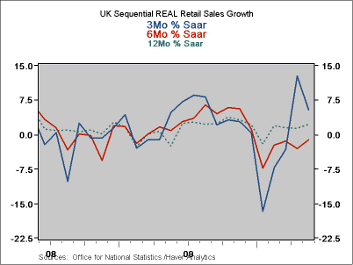 Global| Jun 17 2010
Global| Jun 17 2010UK Retail Sales Show Improvement
Summary
UK retail sales rose by 0.4% in May as April sales were revised lower. The volume of ex-auto retail sales rose 0.6% from a month earlier and gained 2.2% on a year-to-year basis in May. The year-to-year increase was the strongest since [...]
 UK retail sales rose by 0.4% in May as April sales were revised lower.
The volume of ex-auto retail sales rose 0.6% from a month earlier and
gained 2.2% on a year-to-year basis in May. The year-to-year increase
was the strongest since November 2009. Economists had expected a 0.3%
monthly gain and a 2.1% year-to-year increase. Both figures were
exceeded but not without some offset.
UK retail sales rose by 0.4% in May as April sales were revised lower.
The volume of ex-auto retail sales rose 0.6% from a month earlier and
gained 2.2% on a year-to-year basis in May. The year-to-year increase
was the strongest since November 2009. Economists had expected a 0.3%
monthly gain and a 2.1% year-to-year increase. Both figures were
exceeded but not without some offset.
April, sales were revised down sharply to show an unchanged reading on the month and a 1.3% increase on the year. That revision obviously undercut the May Year-to-Year result as well- which lacking the revision - would have been much stronger. The UK's statistical bureau, the ONS, originally reported that retail sales rose 0.3% on the month and by 1.8% year-to-year.
Still, May's report leaves UK retail sales with some life and with some near term acceleration. World Cup soccer spending is being credited for some of the bump up. The best news is from the impact on spending in the quarter-to-date where real spending is up at a 7.7% annual rate excluding autos.
2-date
Robert Brusca
AuthorMore in Author Profile »Robert A. Brusca is Chief Economist of Fact and Opinion Economics, a consulting firm he founded in Manhattan. He has been an economist on Wall Street for over 25 years. He has visited central banking and large institutional clients in over 30 countries in his career as an economist. Mr. Brusca was a Divisional Research Chief at the Federal Reserve Bank of NY (Chief of the International Financial markets Division), a Fed Watcher at Irving Trust and Chief Economist at Nikko Securities International. He is widely quoted and appears in various media. Mr. Brusca holds an MA and Ph.D. in economics from Michigan State University and a BA in Economics from the University of Michigan. His research pursues his strong interests in non aligned policy economics as well as international economics. FAO Economics’ research targets investors to assist them in making better investment decisions in stocks, bonds and in a variety of international assets. The company does not manage money and has no conflicts in giving economic advice.
More Economy in Brief
 Global| Feb 05 2026
Global| Feb 05 2026Charts of the Week: Balanced Policy, Resilient Data and AI Narratives
by:Andrew Cates






